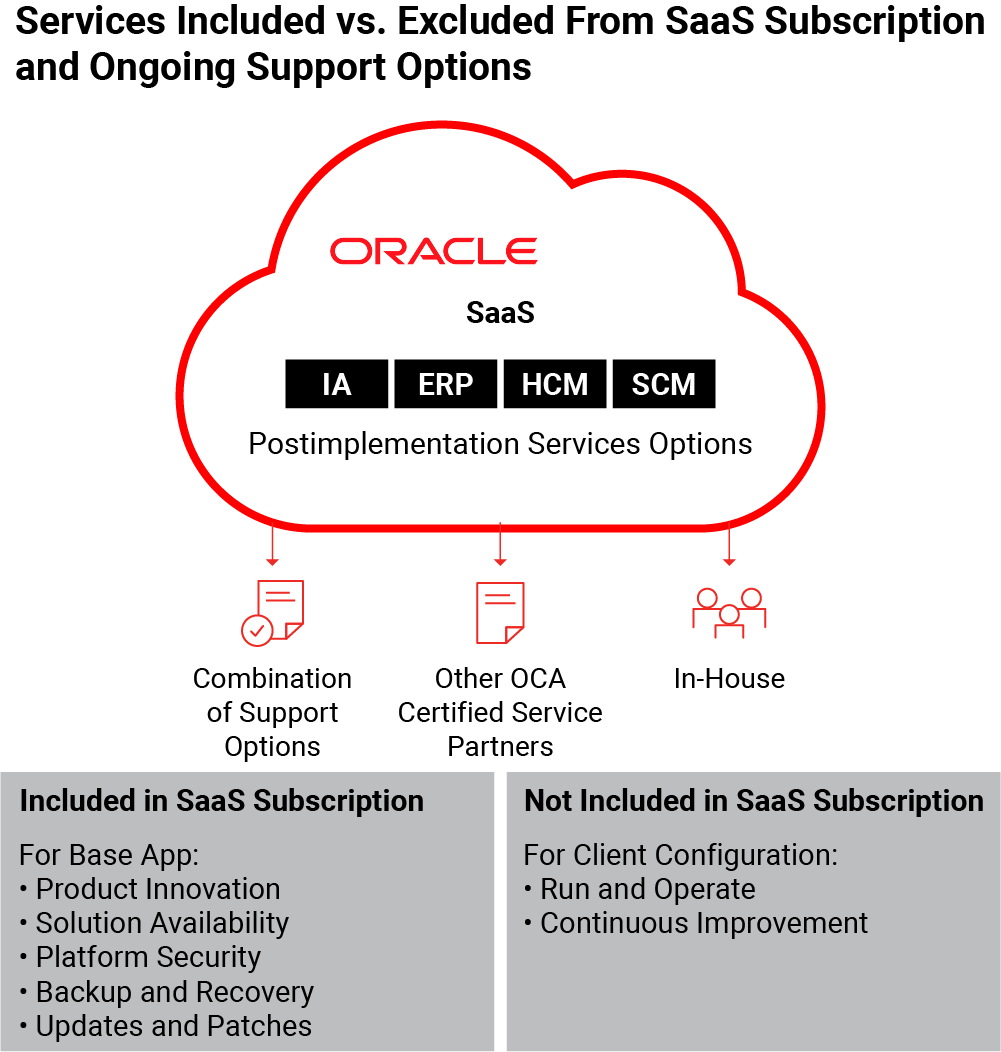Oracle SaaS license agreements do not cover continuous improvement tasks needed in run and operate environments, which requires clients to buy additional support. There are major four options available for post-OCA implementation support to choose from with their own pros and cons.
Base SaaS subscriptions for Oracle Cloud Applications (OCA) do not cover many of the activities necessary to manage a successful SaaS solution in a run environment (see Table 2). Therefore, it is critical to identify the tasks needed and select the appropriate resourcing options.

What are my 4 Post-implementation Managed Services Support Options for Oracle Cloud ERP SaaS?
Four Oracle Cloud ERP Support Options
Support Option 1: Oracle Cloud Certified Partner
| Implementer: | New service provider: | Incumbent: |
| Contract with the same service provider that implemented the SaaS product for additional postimplementation services. | Contract with a different service provider than the one that implemented the solution. | Continue to work with a provider currently supporting your application portfolio. |
|
Engage Full Time End-to End Services |
||
|
Tailored Package – Oracle SaaS Managed Services Bundle |
||
Oracle partners with many system integrators (SI) and provides training to their resources to implement and support the Oracle Cloud Application. Look out for Oracle cloud expert certified CSPE’s specialized partners, certified to consult, build, operate, migrate & manage applications to Oracle Cloud IaaS & PaaS, for critical and non-critical applications – All of this under a single Contract and single point of contact. These SIs have an established relationship with Oracle products and services and, in some cases, can influence Oracles’ products evolution and solutions roadmap. Your options for selecting a post implementation support provider can be:
- The Oracle Application Implementer: If you are using an Oracle certified partner for implementation, you may want to validate its capability to support ongoing maintenance. Though most partners can offer managed end-to-end services (from assessment through ongoing support), not all may be the right fit or have the required resources. The benefit of using an implementer for ongoing support is its familiarity with your environment and the reduced need for post implementation knowledge transfer.
- Another Oracle Certified Partner: Your service provider evaluation criteria for implementation and support could result in the need to contract with another, more qualified service partner. In such cases, IT leaders should begin the contracting process with the post implementation support provider early in the process (ideally during the testing phase). There are many midsize and small Oracle-specific service providers that offer “pay as you use” ongoing service options using non dedicated staff in a center of excellence.
- Incumbent Strategic Partner: If you already have an incumbent service provider supporting your application portfolio, leveraging that existing relationship and signing a new SaaS services agreement to support the new environment allows for improved relationship and possible cost optimization opportunities in contacts for additional work. However, carefully check that your incumbent partner has Oracle-certified resources with relevant experience in your industry. Also ensure that it has the required capability to deliver ongoing support of a cloud application platform because this expertise is different from traditional on-premises managed applications. If the incumbent is qualified, involve it early in the implementation cycle to optimize the knowledge transfer and expedite post implementation support.
Support Option 2: In-House IT Support
- Migrate the operations to your internal IT department, contingent on your organization’s ability and expertise. For smaller implementations, an internal “superuser” may suffice.
Transitioning post implementation support to internal employees may be a viable option. Generally, ongoing support for Oracle SaaS is much less effort-incentive than on-premises solutions because the compute, storage and base application are supported by Oracle as part of your Oracle SaaS subscription.
For very light implementations with very few interfaces or configurations that are operating as standard (e.g., a simple stand-alone HR implementation), it may be possible to use superusers in the business to triage and fix most day-to-day issues. Superusers can also liaise with Oracle as part of the premium SaaS subscription support for advice if needed, but they do not have Oracle or any other party providing technical support for their configuration once implemented.
In addition, some organizations will engage internal IT resources to manage the technical health of the platform. Those IT employees will need to learn the basic Oracle operations required.
The specific Oracle expertise is usually not available in the in-house team, primarily regarding quarterly updates readiness and/or implementing regression testing. Because of this, Gartner rarely sees clients opting to fully cover this activity in house except in the case of a very simple single-module implementation.
Building in-house capability for a more complex implementation is a strategic decision each organization needs to make knowing the pros and cons and learning curve involved.
Support Option 3: Combination of Support Options
As outlined above, you will need some ongoing services, but these are not as big as the traditional managed services agreements that became normal for large on-premises Oracle instances. If your selected service provider proposal shows a large team of dedicated staff will be needed even in an onshore-offshore model, then you may want to consider other options.
A combination of support options is also a possibility.
Oracle offers separately contracted ACS support packages for all platforms, including cloud and on-premises implementations. Many customers include some support from Oracle as part of their subscription agreement but will then consider additional options to supplement the basic technical support.
Looking at the activities you need to address in, you may prefer to work with a smaller provider or internal center of excellence team for some ongoing support services rather than a premium incumbent or implementation partner. You may want to select a lower level of ongoing support through Oracle and supplement with a service partner or an internal superuser. You may still use yet another provider for project-by-project additions of new capabilities or even go back to your original implementation partner.
Key Service Responsibilities for Client to Source in Oracle Cloud ERP Management
Be aware, however, that more handoffs mean more overhead and likely higher total cost, so a simplified support model is best. Unless your environment is primarily Oracle, you will have other ongoing support needs, and many of these may still be very traditional. You should consider how the options chosen for ongoing OCA services mesh with the other ends of the interfaces and other parts of the platforms that deliver your business capabilities.
TO RUN AND OPERATE |
FOR CONTINUOUS IMPROVEMENT |
Cloud priority support:
Business help desk:
Critical process management:
Regression testing:
Extension and integration management:
|
|
Still not sure, whether you have to engage full-time support, engage ITC and leverage one of our tailored Oracle SaaS Managed Services bundles – All of this on a monthly payout. Speak to an Expert Now!




